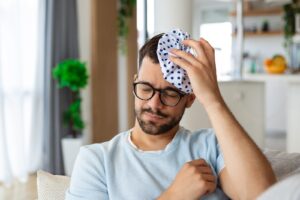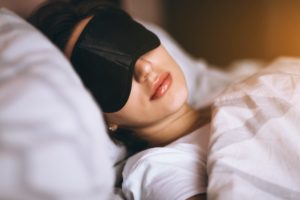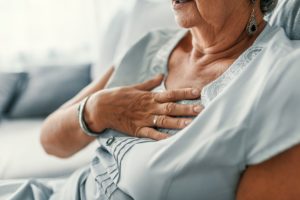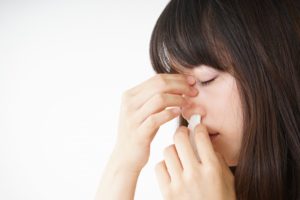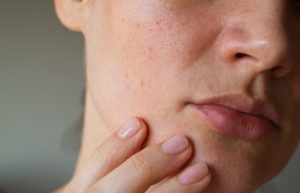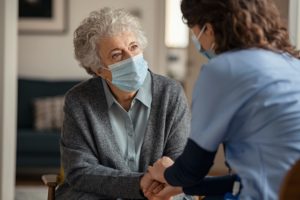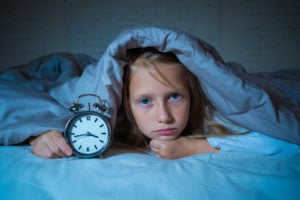Cancer and Sleep
As knowledge has grown about sleep’s integral role in overall health, many experts have turned their attention to how sleep and cancer are connected. Sleep problems may be a risk factor for developing certain types of cancer. They may also affect the progression of cancer and the effectiveness of treatment. In addition, cancer can affect sleep.
While this is still an evolving field of research, learning more about the complex relationship between cancer and sleep creates opportunities to improve health.
How Cancer Affects Sleep Quality
Having cancer can create major sleep disruptions, affecting the ability to fall asleep and stay asleep through the night.
It is estimated that half of all people with cancer have sleep problems. Some studies have found even higher numbers of sleep disturbances depending on the type and stage of cancer.
There are numerous potential causes of sleep problems in people with cancer, which can vary for any individual depending on the type of cancer they have, the treatment they are receiving, and their overall health, including coexisting conditions. Sleep problems may be caused by:
- Pain or discomfort caused by a tumor or by treatment
- Gastrointestinal or urinary problems caused by cancer or its treatment
- Struggling to sleep during hospital stays
- Stress, anxiety, and depression that can result from having cancer
- Infection and fever, as a result of reduced immune function during chemotherapy
- Cough or difficulty breathing
- Side effects from medications
- Disrupted sleep schedule resulting from daytime fatigue and napping
Cancer or cancer treatment may also induce symptoms of other sleep disorders.
Can a Lack of Sleep Cause Cancer?
Evidence has emerged that different components of sleep, including sleep duration, sleep quality, circadian rhythm, and sleep disorders, can affect cancer risk. That said, studies on this topic are not always consistent or conclusive, which may reflect difficulties in accurately gathering data about sleep over the long-term.
Sleep Duration and Cancer Risk
Studies about the effect of sleep duration on cancer risk have often been conflicting. Differences in results may relate to how sleep data is collected, the types of cancer considered, and how other factors that can influence cancer risk are accounted for.
One large-scale study found that people with short sleep have an increased cancer risk . Short sleep duration has specifically been associated with a greater risk of colon polyps that can become cancer. In older adults, some research has tied reduced sleep duration to a higher likelihood of stomach cancer and found potential correlations with cancers of the thyroid, bladder, head, and neck. These studies, though, are far from definitive. Many types of cancer, including lung cancer , have not been found to be affected by short sleep in other studies.
Researchers have also looked at long sleep duration, usually defined as sleeping more than nine hours per night, and found potential links to cancer risk. This amount of sleep was found in one study to elevate the risk of colorectal cancer in older adults , especially those who were overweight or snored frequently. Long sleep duration has been associated with an increase in risk of primary liver cancer and breast cancer .

Sleep Quality and Cancer Risk
Sleep quality is often even more difficult to accurately measure than sleep duration, especially over the long-term, which can make it challenging to clearly determine its effects on cancer risk.
In studies with mice, fragmented sleep triggered types of inflammation that promoted tumor growth and progression . For adults over age 50, researchers have found a higher cancer risk in those who rated their sleep quality as intermediate or poor.
As with sleep duration, more research is needed. Future research may help identify how specific elements of sleep quality, such as the number or length of sleep interruptions, affect the likelihood of developing particular types of cancer.
Circadian Rhythms and Cancer
The body’s internal clock controls 24-hour cycles known as circadian rhythms. A specific part of the brain called the suprachiasmatic nucleus (SCN) sends signals throughout the body to optimize activity based on the time of day.
Light is a key driver of circadian rhythms. When not exposed to artificial light, people quickly adjust to a schedule of being awake during daylight hours and asleep when it is dark. In modern society, though, constant artificial light, night shifts at work, and rapid travel across time zones can cause an individual’s circadian rhythm to be misaligned with natural daylight hours.
A growing body of evidence indicates that circadian disruption can play a role in the development of cancer . Circadian signals are involved in how cells grow and divide with implications for how mutations and DNA damage can occur. Hormone production and metabolism as well as immune function are subject to circadian influence and can be disturbed by a misaligned circadian rhythm.
The far-reaching influence of circadian rhythm on these bodily systems means that circadian disruption involves multiple potential links to the development of cancers, including breast cancer as well as cancer of the liver, colon, lung, pancreas, and ovaries .
Working at night, known as shift work, is often a cause of circadian misalignment, and shift workers have been found to have an elevated risk of cancer .
How Sleep Affects Cancer Growth
Sleep may play a role in the progression of cancer and its growth over time. Some of the factors related to cancer risk, such as the impact of sleep on hormones, metabolism, and inflammation, may affect cancer’s aggressiveness, but additional research is necessary to clarify this potential connection.
One study found that breast cancer metastasizes at a higher rate during sleep . Certain hormones that are affected by the circadian rhythm, including melatonin and testosterone, may play a role in how tumor cells grow and circulate through the bloodstream. However, this research is still in its early stages and the relationship between sleep and cancer growth is likely complex. Sleep is essential for overall health, and people with cancer should take measures to ensure they are getting quality sleep each night.
Managing Sleep During Cancer Treatment
Because the process of cell growth and division is affected by circadian rhythm, cancer cells may be more vulnerable or resistant to treatments depending on when treatment is given. Cancer drugs often target specific proteins, enzymes, or receptors on the surface of cells, and many of these are affected by circadian timing.
Though still developing, chronotherapy is a component of cancer treatment that works to optimize radiation therapy, chemotherapy, or immunotherapy based on a person’s circadian rhythm. Some researchers hope that chronotherapy can enable treatments to kill more cancer cells while reducing damage to healthy tissue.
Sleeping well may affect the way that cancer patients recover and respond to treatment. For example, poor sleep has been connected to higher levels of pain, longer hospital stays, and a greater chance of complications in women undergoing surgery for breast cancer.
Improving Sleep and Coping With Cancer
For people with cancer who are experiencing sleep problems, it is important to talk with a doctor who can discuss their symptoms, what is causing them, and potential solutions. Because of sleep’s effect on physical health, emotions, and thinking, better sleep can create meaningful quality of life improvements for cancer patients.
Counseling and medications can both benefit sleep. In studies of people with breast cancer, treatment with cognitive behavioral therapy for insomnia (CBT-I), which tries to reframe negative thoughts about sleep, has been found to enhance sleep and mood while strengthening immune function . Combining CBT-I with medications may have additional effectiveness in improving sleep and quality of life.
It may also help cancer patients to improve their sleep hygiene, which includes their bedroom setting and daily sleep habits. Examples of these improvements include following a consistent sleep schedule, ensuring the bed and bedroom are comfortable and inviting, and minimizing the use of electronic devices in the lead-up to bedtime.
Sleep and Cancer Survivorship
Being diagnosed with cancer can bring about a variety of significant life changes. The physical and emotional effects of having cancer and going through cancer treatment can be long-lasting, creating diverse challenges for cancer survivors.
In one study of breast cancer survivors who were between six months and five years post-diagnosis, 78% had above-average sleep difficulties . Survivors have also listed sleep as one of the most important issues for their health.
Addressing sleep problems can be especially important for survivors of childhood cancer. Childhood cancer and its treatment often lead to long-term effects, including impacts on both mental and physical development. Quality sleep may help reduce these effects and bolster the immune system to strengthen their overall well-being.
Cancer survivors should talk with their doctor about creating a wellness plan that covers not just sleep but also other important health concerns like diet, exercise, and follow-up care. This plan can include steps for effective sleep hygiene to promote positive sleep habits.
Sleep and Cancer Caregivers
While they may be focused on the well-being of a loved one, caregivers of people with cancer frequently encounter their own sleep challenges. Fragmented sleep from nighttime interruptions to provide care, heightened levels of stress and anxiety, and lack of time to address their own health needs can all play a part in poor sleep among caregivers. Unfortunately, that lack of sleep can create risks for their own health and hinder their ability to effectively provide quality care.
It is important for caregivers to make time for self-care, including trying to develop a sleep schedule that is as stable as possible. Other family members, friends, or local organizations may provide services to help with certain aspects of caregiving, enabling a caregiver to find time to devote to their physical and emotional wellness.

Still have questions? Ask our community!
Join our Sleep Care Community — a trusted hub of sleep health professionals, product specialists, and people just like you. Whether you need expert sleep advice for your insomnia or you’re searching for the perfect mattress, we’ve got you covered. Get personalized guidance from the experts who know sleep best.
References
18 Sources
-
von Ruesten, A., Weikert, C., Fietze, I., & Boeing, H. (2012). Association of sleep duration with chronic diseases in the European Prospective Investigation into Cancer and Nutrition (EPIC)-Potsdam study. PloS one, 7(1), e30972.
https://www.ncbi.nlm.nih.gov/pubmed/22295122 -
Thompson, C. L., Larkin, E. K., Patel, S., Berger, N. A., Redline, S., & Li, L. (2011). Short duration of sleep increases risk of colorectal adenoma. Cancer, 117(4), 841–847.
https://www.ncbi.nlm.nih.gov/pubmed/20936662 -
Gu, F., Xiao, Q., Chu, L. W., Yu, K., Matthews, C. E., Hsing, A. W., & Caporaso, N. E. (2016). Sleep Duration and Cancer in the NIH-AARP Diet and Health Study Cohort. PloS one, 11(9), e0161561.
https://www.ncbi.nlm.nih.gov/pubmed/27611440 -
Khawaja, O., Petrone, A. B., Aleem, S., Manzoor, K., Gaziano, J. M., & Djousse, L. (2014). Sleep duration and risk of lung cancer in the physicians’ health study. Zhongguo fei ai za zhi = Chinese journal of lung cancer, 17(9), 649–655.
https://www.ncbi.nlm.nih.gov/pubmed/25248705 -
Zhang, X., Giovannucci, E. L., Wu, K., Gao, X., Hu, F., Ogino, S., Schernhammer, E. S., Fuchs, C. S., Redline, S., Willett, W. C., & Ma, J. (2013). Associations of self-reported sleep duration and snoring with colorectal cancer risk in men and women. Sleep, 36(5), 681–688.
https://www.ncbi.nlm.nih.gov/pubmed/23633750 -
Royse, K. E., El-Serag, H. B., Chen, L., White, D. L., Hale, L., Sangi-Haghpeykar, H., & Jiao, L. (2017). Sleep Duration and Risk of Liver Cancer in Postmenopausal Women: The Women’s Health Initiative Study. Journal of women’s health (2002), 26(12), 1270–1277.
https://www.ncbi.nlm.nih.gov/pubmed/28933583 -
Richmond, R. C., Anderson, E. L., Dashti, H. S., Jones, S. E., Lane, J. M., Strand, L. B., Brumpton, B., Rutter, M. K., Wood, A. R., Straif, K., Relton, C. L., Munafò, M., Frayling, T. M., Martin, R. M., Saxena, R., Weedon, M. N., Lawlor, D. A., & Smith, G. D. (2019). Investigating causal relations between sleep traits and risk of breast cancer in women: mendelian randomisation study. BMJ (Clinical research ed.), 365, l2327.
https://pubmed.ncbi.nlm.nih.gov/31243001/ -
Hakim, F., Wang, Y., Zhang, S. X., Zheng, J., Yolcu, E. S., Carreras, A., Khalyfa, A., Shirwan, H., Almendros, I., & Gozal, D. (2014). Fragmented sleep accelerates tumor growth and progression through recruitment of tumor-associated macrophages and TLR4 signaling. Cancer research, 74(5), 1329–1337.
https://pubmed.ncbi.nlm.nih.gov/24448240/ -
Song, C., Zhang, R., Wang, C., Fu, R., Song, W., Dou, K., & Wang, S. (2021). Sleep quality and risk of cancer: Findings from the English longitudinal study of aging. Sleep, 44(3), zsaa192.
https://pubmed.ncbi.nlm.nih.gov/32954418/ -
Lamia K. A. (2017). Ticking time bombs: connections between circadian clocks and cancer. F1000Research, 6, 1910.
https://pubmed.ncbi.nlm.nih.gov/29152229/ -
Samuelsson, L. B., Bovbjerg, D. H., Roecklein, K. A., & Hall, M. H. (2018). Sleep and circadian disruption and incident breast cancer risk: An evidence-based and theoretical review. Neuroscience and biobehavioral reviews, 84, 35–48.
https://www.ncbi.nlm.nih.gov/pubmed/29032088 -
Shafi, A. A., & Knudsen, K. E. (2019). Cancer and the circadian clock. Cancer Research, 79(15), 3806–3814.
https://pubmed.ncbi.nlm.nih.gov/31300477/ -
Haus, E. L., & Smolensky, M. H. (2013). Shift work and cancer risk: potential mechanistic roles of circadian disruption, light at night, and sleep deprivation. Sleep medicine reviews, 17(4), 273–284.
https://pubmed.ncbi.nlm.nih.gov/23137527/ -
Diamantopoulou, Z., Castro-Giner, F., Schwab, F. D., Foerster, C., Saini, M., Budinjas, S., Strittmatter, K., Krol, I., Seifert, B., Heinzelmann-Schwarz, V., Kurzeder, C., Rochlitz, C., Vetter, M., Weber, W. P., & Aceto, N. (2022). The metastatic spread of breast cancer accelerates during sleep. Nature, 607(7917), 156–162.
https://pubmed.ncbi.nlm.nih.gov/35732738/ -
Wang, J. P., Lu, S. F., Guo, L. N., Ren, C. G., & Zhang, Z. W. (2019). Poor preoperative sleep quality is a risk factor for severe postoperative pain after breast cancer surgery: A prospective cohort study. Medicine, 98(44), e17708.
https://pubmed.ncbi.nlm.nih.gov/31689803/ -
Savard, J., Simard, S., Ivers, H., & Morin, C. M. (2005). Randomized study on the efficacy of cognitive-behavioral therapy for insomnia secondary to breast cancer, part II: Immunologic effects. Journal of Clinical Oncology, 23(25), 6097–6106.
https://pubmed.ncbi.nlm.nih.gov/16135476/ -
Schreier, A. M., Johnson, L. A., Vohra, N. A., Muzaffar, M., & Kyle, B. (2019). Post-treatment symptoms of pain, anxiety, sleep disturbance, and fatigue in breast cancer survivors. Pain Management Nursing, 20(2), 146–151.
https://pubmed.ncbi.nlm.nih.gov/30527856/ -
Rogers, L. Q., Courneya, K. S., Oster, R. A., Anton, P. M., Robbs, R. S., Forero, A., & McAuley, E. (2017). Physical Activity and Sleep Quality in Breast Cancer Survivors: A Randomized Trial. Medicine and science in sports and exercise, 49(10), 2009–2015.
https://pubmed.ncbi.nlm.nih.gov/28538261/


